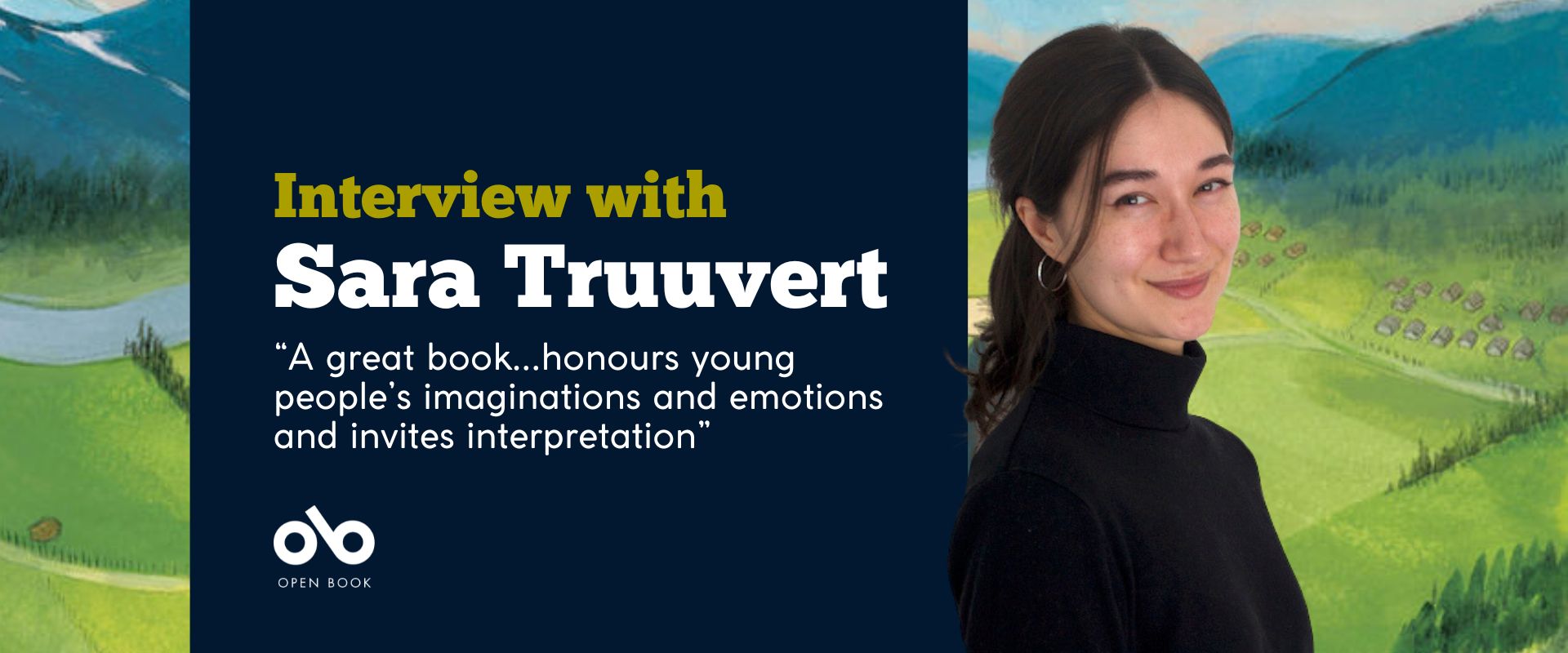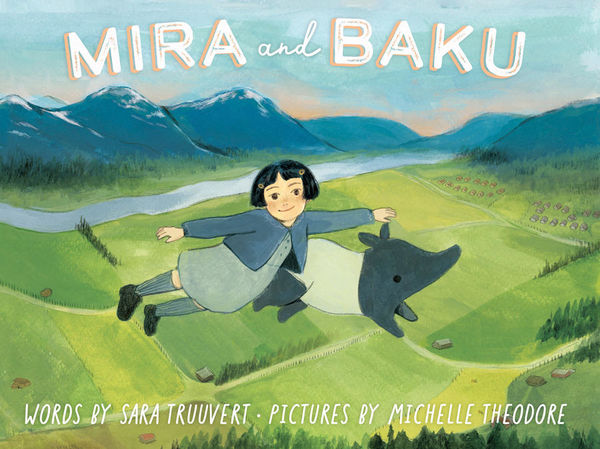Sara Truuvert Explores a Child's View of Japanese Internment in Her Moving First Picture Book
In Japanese folklore, a baku is a chimeric creature that children can call on to protect them from bad dreams – an eater of nightmares. In fiction writer and poet Sara Truuvert's first picture book Mira and Baku (Annick Press, illustrated by Michelle Theodore), Mira calls on her imaginary friend Baku to help her find her father, who hasn't come home despite the fact that her birthday, which he has never missed, is fast approaching.
Mira and Baku is set during the racist Japanese Canadian incarceration that took place during and in the years following World War II, with Mira and her mother living in one of the forced detention camps. Over 90% of the total Japanese Canadian population at the time was relocated and confined in such camps, with many being stripped of homes, jobs, boats, cars, businesses, and personal possessions.
Amidst this grim setting and her father's haunting absence, we see Mira's childlike faith and the resilience of her imagination as she and Baku embark on adventures through farms and woods, across rivers and up into the mountains on their determined search.
A tender and thoughtful book, Mira and Baku is beautifully illustrated, creating a dreamy and lush environment to tell a tale about the serious subjects of family separation, government and social discrimination, and the power of Mira's love and hope as represented in Baku. Truuvert also includes valuable further reading resources for children and caregivers about the internment of Japanese Canadians and Japanese Americans and its impact.
We're speaking with her today about creating Mira and Baku and writing for young readers for the first time. She tells us about how a poem she wrote for adults unexpectedly led to the genesis of Mira and Baku, about drawing on her own childhood anxieties to create authentic feelings for Mira, and why she feels the best kind of children's book "doesn’t pander or instruct. Rather, it honours young people’s imaginations and emotions".
Open Book:
Tell us about your new book and how it came to be.
Sara Truuvert:
Mira and Baku is a picture book about a young girl named Mira, who is searching for her father. It’s set during WWII in the time of Japanese Canadian and Japanese American internment. With the help of her imaginary friend, Baku, Mira tries to make sense of being uprooted from her home and separated from her father. Michelle Theodore created the book’s gorgeous illustrations.
Before Mira and Baku, I hadn’t written creative work for young readers. I primarily write fiction and poetry for an older audience. An editor from Annick Press, the wonderful Claire Caldwell, read one of my poems in a literary magazine. She reached out to ask if I’d ever considered writing for children. We met virtually, and she invited me to prepare some pitches. We felt especially drawn to the story that would become Mira and Baku. I drafted a manuscript, Claire and I collaborated on edits, and then Annick Press acquired it.
OB:
Is there a character in your book that you relate to? If so, in what ways are you similar to your character and in what ways are you different?
ST:
Yes, Mira! Our circumstances are different, but Mira was inspired by emotions I remember from my childhood. I was anxious about being separated from my parents and put in new situations—I cried every day of Grade One for quite a while. Change in general felt overwhelming. It was hard to cope with these emotions, and I often turned to games of make-believe and imaginary friends, as Mira does with Baku. (My real-world friends and family helped too, of course!)
Your CanLit News
Subscribe to Open Book’s newsletter to get local book events, literary content, writing tips, and more in your inbox
OB:
What was the strangest or most memorable moment or experience during the writing process for you?
ST:
Mira and Baku is my first piece of creative writing for young readers, so a memorable point in the writing process was receiving feedback from Claire about writing for a picture book specifically. I’m not a visual artist or a particularly visual thinker, so it was helpful to have her expertise in balancing words and images to deliver information and emotional impact most effectively. Where could a spread or a series of spot illustrations do the work of text? How do page breaks affect pace and overall flow of the story? Etc.
OB:
How do you cope with setbacks or tough points during the writing process? Do you have any strategies that are your go-to responses to difficult points in the process?
ST:
I wrote this book by waking up early before work and had a limited time to get things done. It was discouraging when I didn’t get words physically down on the page, and I felt I had “wasted” the little time I had. I found two things especially helpful in pushing through: firstly, sticking to a routine. Even if I sat there and wrote something I knew I’d have to edit heavily later, or nothing at all, showing up every day made sure I at least focused on the project, even if I didn’t produce anything. And secondly, I reminded myself that time spent thinking about the story, reading, researching, brainstorming, etc. is also part of the writing process, even if you don’t have as much to show for it in the moment.
OB:
What defines a great book for young readers, in your opinion? Tell us about one or two books you consider to be truly great kids books, whether you read them as a child or an adult.
ST:
In general, I think great books are thoughtful, respect young readers’ intelligence and experiences, and are made with care. I admire Where the Wild Things Are by Maurice Sendak. You could skim through it and say there’s no “point” or lesson and that the wild things are too scary for kids. But it so beautifully captures the experience of exploring fantasy worlds to process emotions and the external world. Importantly, it acknowledges the darkness that can permeate that experience. It also touches in a delicate way on the disconnect between young people and the adults in their lives, even when relationships are loving. The language is lean, precise, and musical. And the illustrations are unforgettable. It doesn’t pander or instruct. Rather, it honours young people’s imaginations and emotions and invites interpretation, which is incredibly valuable.
OB:
What are you working on now?
ST:
I’m working on a novel aimed at an older audience. It reimagines a Japanese folktale in present-day Toronto. I acknowledge the support of the Canada Council for the Arts. I’d also like to acknowledge funding support from the Ontario Arts Council and the Government of Ontario for their support. I’ve also got a play and a short story on the go. Too many things, probably!
______________________________________________________
Sara Truuvert is a Canadian author of Japanese-Estonian descent. She grew up in Toronto and now lives in Ottawa, Ontario, where she writes everything from short fiction to poetry to science articles. Mira and Baku is her first picture book.





